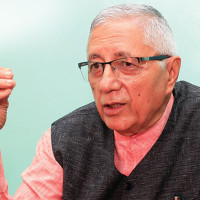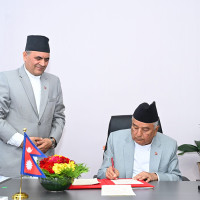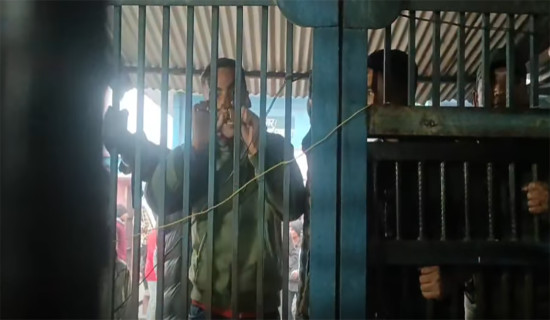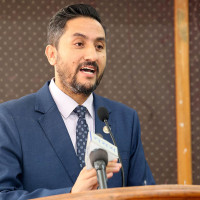- Saturday, 20 December 2025
Climate change hitting mountains hardest, says PM Oli
By A Staff Reporter,Kathmandu, Jan. 22: Prime Minister KP Sharma Oli has announced the date for the much-awaited Sagarmatha Sambaad (dialogue) to be held in Kathmandu from May 16 to 18, 2025.
Announcing the global dialogue on “Climate Change, Mountains and the Future of Humanity,” on Tuesday, Prime Minister Oli said that the first edition of the Sambaad will deal with the issue of climate change - especially in the context of mountains. “Climate change is not only a part of the poly-crisis that the world faces today. It could equally morph into a ‘perma-crisis’ that would hover above the heads of coming generations,” he said.
This year alone, the country has seen many disasters in all kinds of places. The fury of nature has not spared even those countries with sophisticated economies and technology. The fallouts of climate change will be even more disastrous if the world does not halt the march of folly, the Prime Minister said.
“As we can see, climate change is hitting the high mountains and coastal areas the hardest. And the Himalayas are no exception. Due to elevation-dependent warming, the temperature of our mountains is increasing faster than the global average,” he said.
According to the Prime Minister, Nepal’s snow-clad mountains serve as a natural stabilizer for the planet's climate. The Himalayas are often referred to as the ‘Third Pole’ due to their significant impact on maintaining the health of the oceans. These snow-clad peaks function as heatsinks. Their glaciers and snowmelt feed rivers that sustain vegetation, ecosystems and the lives of the people living downstream. The global ‘Water Tower’ is sadly drying out.
“Indeed, there is an inherent connection between mountains and oceans, with many ecosystems relying on each other. Consequently, any ecological changes in the mountains can have widespread effects around the planet, including impacts on coastal regions, small island states and oceans,” PM Oli said.
He also said that the rapid melting of snow and unpredictable precipitation have transformed once snow-clad glittering white mountains into black rocks. “Our naked eyes can see the fast-depleting ice coverage in Ganesh/Dorje Lhakpa Himal from the roof of this building,” he said.
“And the worry is not that the mountains are becoming less picturesque. It is not a question of whether the mountains are still photogenic. The very survival of people, societies and culture is at stake in the context of climate disasters. What we went through in 2024 in Thame in the Everest region during the Glacier Lake Outburst Flood and in Bagmati Province during the incessant post-monsoon pouring were natural emergencies posing a threat to survival, sustenance and progress of a mountainous country like Nepal,” he said. Such incidents have now become more routine phenomena rather than rare disasters. The immense scale of destruction from such events makes our recovery and reconstruction efforts daunting, given the availability of limited resources, the Prime Minister said.
It is with this realization that the idea of Sagarmatha Sambaad was conceived in 2019. But, the outbreak of the COVID-19 pandemic stalled the initial plans to host the first edition of this dialogue, PM Oli said.
“In such a context, Nepal’s Sagarmatha Sambaad will add value for at least three reasons, he said. First, the domestic success stories of Nepal. While it is easy to succumb to cynicism, we must not forget the gains that Nepal has made in recent years. Our homegrown peace process has much to offer to the world. Through people’s participation and representation, we have an inclusive democracy and we are making our full efforts to make democracy comprehensive across all dimensions. We are trailblazers in women’s empowerment and political participation. The hitherto marginalised sections of society are increasingly coming into the mainstream,” he said.
With political issues largely settled, we are fully focused on socio-economic transformation. Our national aspiration, “Prosperous Nepal, Happy Nepali,” is rooted in economic equity and societal well-being, according to PM Oli.
Second, the unique historical outlook of Nepal, he said. Historically, we have a long legacy as a land of sages and seekers. The wisdom of ancient philosophers still resonates today. This has shaped our worldview to seek global harmony, peace, and security.
Third, the location that Nepal offers. If one sees the map, we are very much in the heart of Asia. While the centre of economic gravity is shifting to Asia, our location has immense prospects to be a convening venue for global dialogues.
“Moreover, we have been a staunch supporter of multilateralism and rules-based international order. Our foreign policy is that of amity with all and enmity with none. We not only value world peace but have also actively contributed to it through our participation in peacekeeping. Nepal is increasingly an important voice in issues of climate change, migration, and sustainable development,” he said.
“In this backdrop, we plan to organise the Sagarmatha Sambaad biennially focusing on pertinent themes and important issues of global and regional significance. This also aligns with Nepal’s consistent policy of promoting global understanding and cooperation through dialogue, consensus building and collaboration. Thus, the Sambaad originates in deep conviction and faith in the notions of the common good and the collective well-being of humanity,” the Prime Minister said.
“While we announce the Sambaad today, we are also expressing the solidarity with the urgent call reflected in UN’s International Year of Glaciers’ Preservation 2025 to preserve the fast-receding glaciers and to raise awareness on the importance of earth’s rare resources like snow-capped Himalayas and slow-moving but fast-depleting glaciers.”
According to him, despite our minimal carbon footprint, Nepal faces devastating climate impacts. However, Nepal is committed to achieving net-zero emissions by 2045 and implementing ambitious climate plans. We have expanded forests, promoted clean energy, and safeguarded biodiversity.
“Yet, our efforts alone cannot suffice. And we cannot forever overcompensate for the complacency of those who were historically responsible for the climate crisis. And, I believe that the first edition of Sagarmatha Sambaad will provide an open platform to discuss these issues in earnest,” he said.
Presenting the overview of the Sambaad, Dr. Maheshwor Dhakal, Chief of the Climate Change Management Division under the Ministry of Forests and Environment said that the Sambaad is being organised to develop a shared understanding among nations for an integrated and holistic response to the impact of climate change from mountain regions to coastal areas. The Sambaad also aims to promote multilateral cooperation and partnership for climate finance, technology development and expansion and capacity building, Dr. Dhakal said.
















